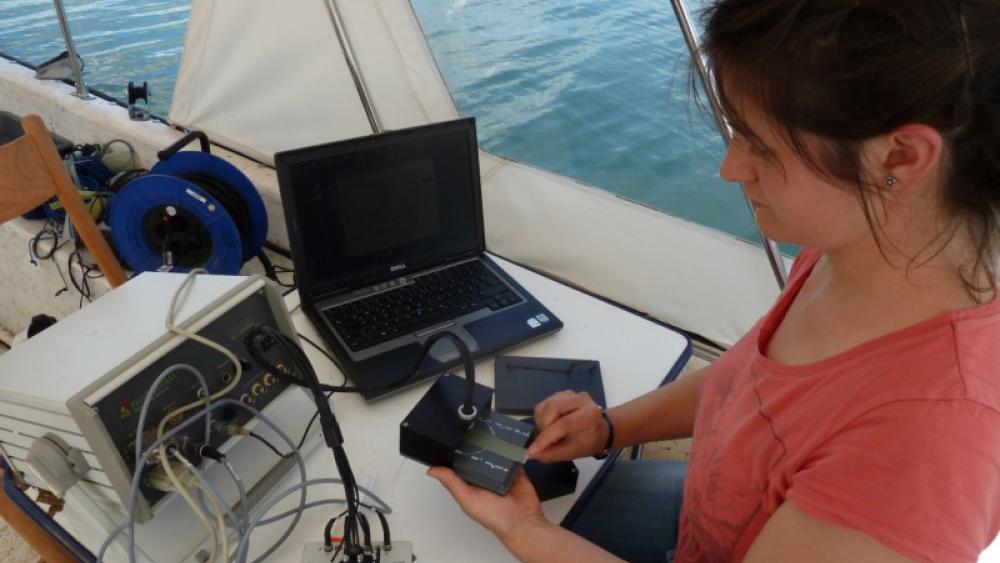
© Martina Bauchrowitz/IGB
This year in May, biologist Susanne Stephan started her doctoral thesis at IGB Stechlin. Together with the other new PhD students, Jeremy Fonvielle and Tim Walles, she jumped into the deep end; the preparations for this year's LakeLab experiment were in full swing so they had to roll up their sleeves and get to work. For days, the new students were out on the platform where they had to scrub the walls of the mesocosms. "This has welded us together as a team immediately!", says Susanne. "I admit that the first two weeks were a little hard to get used to the new environment since I had decided to take this position after a video interview without having been here once." However, she feels very well received and the student group gets along so well that they socialize in their leisure time, explains Susanne.
Her doctoral thesis addresses phytoplankton and periphyton. In the next three years, Susanne will take part in the experiments at the LakeLab and study how these photosynthetic active organisms respond to the simulated environmental changes. Particularly significant impact is expected during this year’s experiment. It aims at estimating the effects of humic substances, which in the wake of climate change-induced strong rains are increasingly washed out from the soils into the lakes. This leads to a brownification of the water so that less light is available to the algal photosynthesis.
The primary production, i.e. the algal biomass produced in a certain time, and the composition of the algal community which is determined using fluorometric methods, are important parameters that Susanne measures for both algal groups. In the case of the periphyton, the PhD student had installed plastic strips (including from the wall material of the LakeLab) in different depths of the mesocosms prior to the start of the experiment. Before the final part of the experiment – the simulation of a storm event – is performed, she takes off the strips which are now overgrown by periphyton. In addition to the above parameters, she conducts a lab analysis of the total quantity of aufwuchs formed and how much phosphorus has been taken up by the periphyton and has thus been removed from the water.
During her master's thesis at the Netherlands Institute for Ecology (NIOO), Susanne focused on plankton, namely on zooplankton. This experience confirmed her wish to go on with research work. As luck would have it, she met a doctoral student from IGB at the NIOO who told her to regularly check the vacancies published on the IGB website; shortly after she had submitted her thesis, there were actually two PhD announcements to participate at the LakeLab – one on zoo- and one on phytoplankton. She applied for both and got the offer for the phytoplankton position only one and a half weeks after the interview. "I immediately accepted it and declined a simultaneous job offer in another laboratory", says Susanne. "I find it incredibly important to assess the consequences of global environmental change. After all, mankind is a 100 percent responsible for it!"
Susanne Stephan
graduated from the Universities of Hamburg and Oldenburg as Bachelor and Master in Biology. For her master's thesis, which she defended in January 2015, she worked at the NIOO, the Netherlands Institute for Ecology, in Wageningen.


